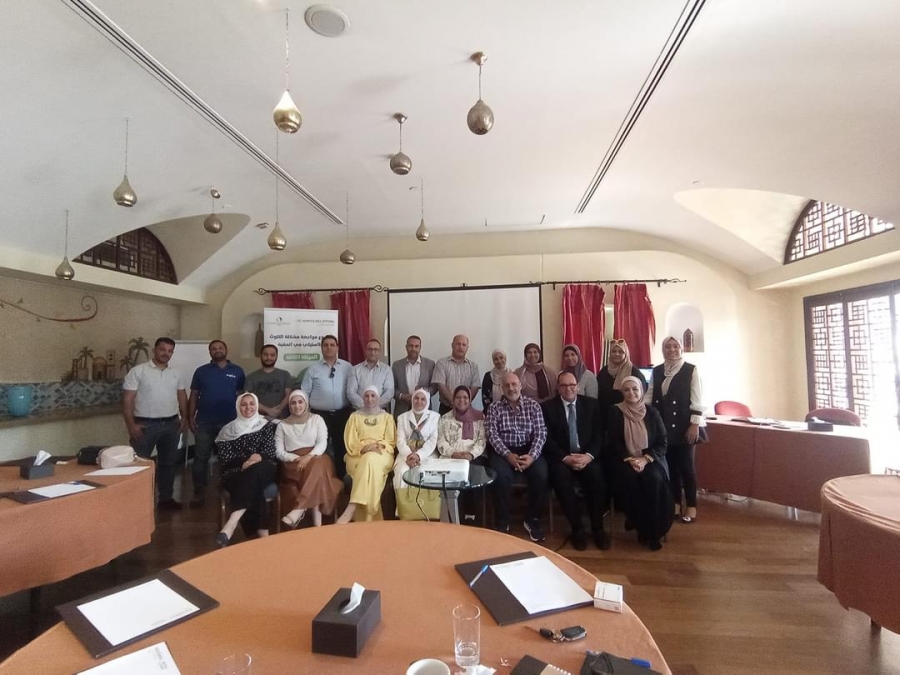Al-Anbat- Dina Mahadeen
Translated by - MAYS ALSHAWABKEH
Finalization of the initiative to alleviate the plastic pollution issue in Aqaba
The accumulation of plastic bags, food bowls, and empty packaging poses the lowest risk of plastic waste to the marine environment. And when this debris builds up, many marine creatures and fish perish as a result of getting stuck in plastic waste and finding it impossible to get rid of it. The garbage fragments into smaller pieces over time, eating fish and causing more harm. Turtles, whales, and seals are the most impacted marine species by plastic garbage, which contaminates their tissues and causes their mortality. They bring bags and empty boxes along with their food. They die as a result of their digestive system becoming clogged. Plastic bag wrapping harms coral reefs in addition to that.
The initiative to address the issue of plastic pollution, funded by The Heinrich- Boll-Foundation - Palestine and Jordan, was completed in Aqaba by the Royal Society for the Protection of the Marine Environment in collaboration with the Aqaba Special Economic Authority. The Authority's Tourism and Environment Commissioner, Dr. Nidal Majali, presided over the final workshop, which was also attended by Nidal Atallah, the Coordinator of The Heinrich- Boll-Foundation -Palestine and Jordan's Environmental Justice Programme, as well as stakeholders, partners, and a few local institutions.
In addition to working with the Al-Aqaba authority to issue trading instructions for plastic bags in Al-Aqaba, the association has been implementing the project for more than three years and collaborating and partnering with the Environment Commission by holding training and awareness workshops for various sectors in the city on the risks of plastics and the possibility of the community contributing to reducing its use in aspects related to food and food storage at least.
In the session, Dr. Mohammed Kheir, an expert in environmental studies, presented a report that described potential alternatives to the plastic bags that will soon be banned from use. Finally, the project's accomplishments were highlighted, and the partners and stakeholders offered their advice and suggestions to ensure that the directives were carried out without difficulty.
Official and security agencies have emphasized their supervision of the beaches in Aqaba in order to prevent the issue, despite the full activation of environmental infractions on residents, tourists, and infringing maritime facilities.
The Special Obstacle Authority did its law on environmental off-shoot, according to the Authority's Environment and Tourism Commissioner Dr. Nidal Majali, who stated that the amount of waste removed from the sea over the past two months demonstrated a disregard for the preservation of the marine environment and the leniency of dumping waste on the Aqaba beach to settle in the Gulf.
People suggested replacing plastic in the daily dining system with glass or metal, which is a sustainable material and does not harm the environment, in order to reduce the impact of plastic waste on the ecosystem.
Others urged us to change our habits, such as buying cloth shopping bags, putting produce in them rather than plastic bags, using paper bags in bakeries, and replacing plastic with cardboard (carton cans) because it can be recycled and used in new sectors. Others suggested switching to wooden versions of any straightforward plastic items, such as clothing attachments.
Regarding seafarers and the threat that the collection of plastic bags poses to the marine environment, they called for the coordination of the relevant authorities as well as the distribution of paper bags to each vehicle in case it enters the shore and their obligation to place waste inside the bags in order to compel citizens not to leave their waste and help preserve a safe marine environment.
The Marine Environment Act of the Aqaba Area Authority strives to make diving at Aqaba's underwater features clean and safe, especially after numerous dive sites have been established to promote them internationally and commercially. "In the coasts of Aqaba, it is banned to contaminate its land, water, or air in any way or to dump waste on the beach or in the sea and in violation of that penalty or punishment," states the Authority's Act No. 32 and the amendments thereto from 2000.

